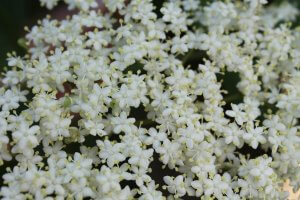What are the best Elderflower liqueur substitutes?
Do you need an elderflower liqueur substitute? If you’re into mixing up delicious cocktails or experimenting in the kitchen, you’re in the right place. Elderflower liqueur, with its delicate and floral notes, can add a unique twist to your drinks and dishes. However, I totally get it if you can’t find this elusive ingredient or simply want to try something new. In this blog post, we’re diving into the world of elderflower liqueur substitutes. Whether you’re making a refreshing summer cocktail or adding a touch of elegance to your desserts, I’ve got some fantastic alternatives for you. Let’s explore these delightful options together!
Try using: Homemade Elderflower Syrup, St. Germain Elderflower Liqueur, Linden Flower Tea, Elderflower Cordial Lavender Syrup, Rosewater, Orange Blossom Water, Chamomile Tea, Honeysuckle Syrup, Jasmine Tea.
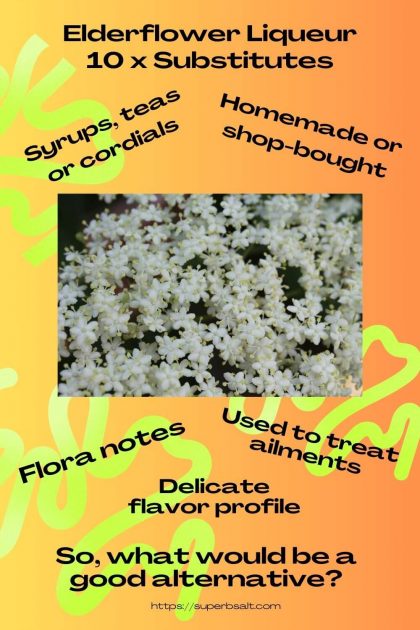
What is Elderflower liqueur?
Elderflower liqueur is a sweet and aromatic liqueur made from the flowers of the elderberry bush. These small, creamy-white elderflowers are known for their delicate and floral aroma, which is captured in the liqueur-making process.
The elderflowers are carefully harvested when they are in full bloom, usually in late spring or early summer. It’s crucial to pick them at the right moment to capture their unique fragrance. Then the freshly picked elderflowers are steeped in a mixture of alcohol (usually a neutral spirit like vodka) and sugar. This infusion process allows the flavors and aromas of the elderflowers to meld with the alcohol.
After the elderflowers have infused their essence into the alcohol, sugar is added to sweeten the liqueur. Remember the amount of sugar can vary depending on the brand and recipe.
The mixture is then carefully filtered to remove any impurities or remaining flower particles. Once clarified, the elderflower liqueur is bottled, ready to be enjoyed in a variety of cocktails, desserts, or even as a standalone aperitif.
Elderflower liqueur is known for its delightful floral and slightly fruity flavor profile. It can add a touch of elegance and complexity to cocktails, such as the classic Elderflower Martini or the popular Elderflower Spritz. It’s also used in desserts, sauces, and even as a drizzle over fresh fruit.
Okay, before we look at your Elderflower liqueur substitute options, let’s deal with that empty cupboard situation!
Where can I buy Elderflower liqueur?
If you want to be more prepared and ensure you don’t run out of elderflower liqueur, then you should stock up now.
Nowadays, most liqueur stores stock elderflower liqueur. Or if you prefer you can also purchase elderflower liqueur on-line.
We have included a link for a non-alcoholic Elderflower Syrup, which we hope you you like.
So why not jump on and place your order today.
STOCK UP NOW!
D’arbo Syrup Single Bottle Elderflower 500ml
A delicious syrup containing no artificial ingredents. Just open and pour.
Add to sparkling minerals, or even Procsecco to create delicious drinks. A small amount goes a long way!
What can I substitute for Elderflower liqueur?
Here are some of the best ingredients to substitute the flavor and role that elderflower liqueur provides in your recipes.
- Homemade Elderflower Syrup
- St. Germain Elderflower Liqueur
- Linden Flower Tea
- Elderflower Cordial
- Lavender Syrup
- Rosewater
- Orange Blossom Water
- Chamomile Tea
- Honeysuckle Syrup
- Jasmine Tea
Elderflower liqueur substitutes
Homemade Elderflower Syrup
Fancy making your own Elderflower Syrup? Here is a quick and easy guide on how to make your own elderflower syrup.
To whip up a batch of this fragrant syrup, you’ll need around 15 elderflower heads, 500g of sugar, 2 lemons, and 1.5 liters of water.
- First, give the elderflower heads a quick rinse under cold water and then gentle shake to remove any bugs.
- Then, place them in a large bowl with the lemon zest and slices. In a separate pot, dissolve the sugar in water over low heat, stirring occasionally.
- Once the sugar is completely dissolved, pour this hot syrup over the elderflowers and lemons. Cover the bowl and let it sit for about 24 hours.
- Next, strain the liquid through a fine mesh sieve or cheesecloth.
- Finally, pour it into sterilized bottles, and there you have it – homemade elderflower syrup!
It’s a versatile ingredient that can be used in cocktails, desserts, or drizzled over pancakes. Hope you enjoy.
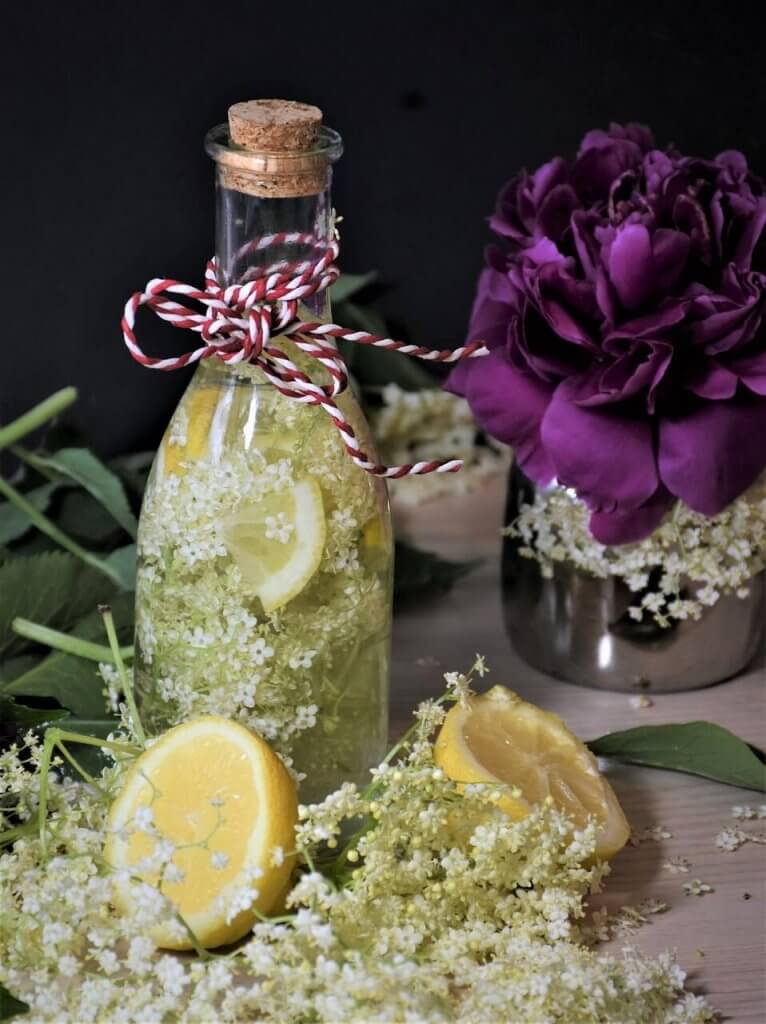
St. Germain Elderflower Liqueur
Substituting St. Germain Elderflower Liqueur for a generic elderflower liqueur is great in recipes. St. Germain has a unique flavor profile, so you’ll want to make sure the substitution maintains that essence. Here’s how you can do it:
- Ratio Adjustment: St. Germain has a strong elderflower flavor. If your recipe calls for a certain amount of generic elderflower liqueur, you might want to use a bit less St. Germain. We suggest about 3/4 to 2/3 of the original amount. Taste as you go and adjust to your liking.
- Balance with Sweetness: St. Germain is slightly sweeter than some generic elderflower liqueurs. To balance this, you can reduce the amount of other sweeteners in your recipe slightly. You can also add a touch more citrus juice if it’s a cocktail.
- Floral Notes: St. Germain has a more pronounced floral aroma. You can enhance this aspect by adding a few drops of elderflower syrup or elderflower cordial along with the St. Germain to really capture that delicate elderflower essence.
- Experiment: Try different ratios and combinations to see what works best for your specific recipes.
Remember, the goal is to maintain the essence of elderflower while adapting to the unique characteristics of St. Germain.
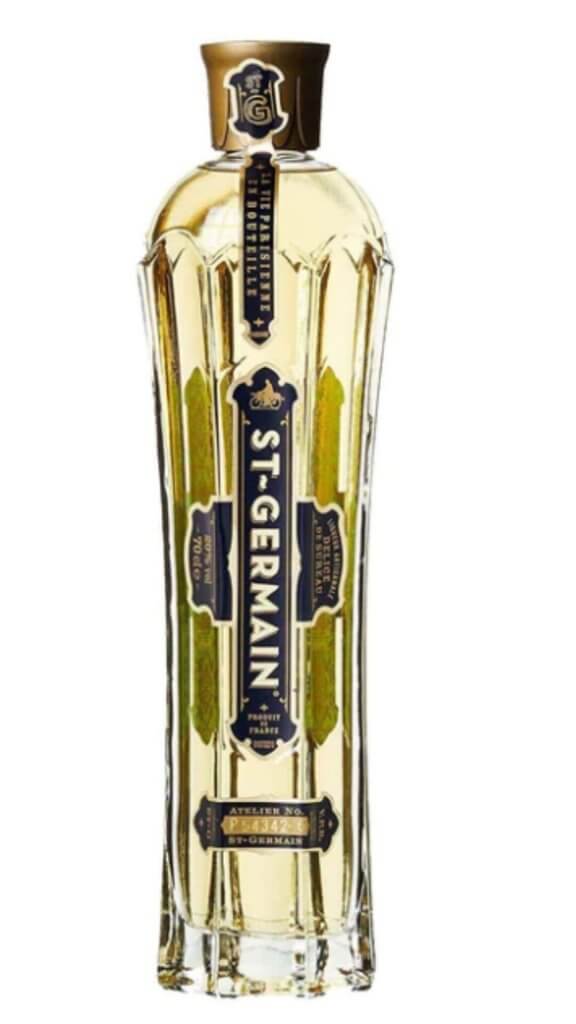
Linden Flower Tea
Substituting linden flower tea for elderflower liqueur in your recipes is a creative twist for your food blog, but it will require some adjustments to capture the essence of elderflower. Here’s how you can do it:
- Prepare Linden Flower Concentrate: Start by brewing a strong linden flower tea. Use about 2 to 3 times the amount of linden flowers you would typically use for a cup of tea to make a concentrated infusion. Let it steep for a longer time, around 10-15 minutes, to extract as much flavor as possible.
- Sweeten and Enhance Flavor: After you’ve brewed the concentrate, sweeten it with sugar or honey to taste. Elderflower liqueur is sweet, so you’ll want to mimic that sweetness. Start with a small amount and adjust as needed.
- Add Citrus Zest or Juice: To mimic the citrusy notes of elderflower liqueur, consider adding a bit of lemon or orange zest or a touch of citrus juice to your linden flower concentrate. This will help brighten up the flavor.
- Dilution: Keep in mind that linden flower tea can be quite potent in flavor. You may need to dilute your linden flower concentrate with a neutral liquid like water or a clear, mild-flavored syrup to match the consistency of elderflower liqueur in your recipes.
- Experiment: As with any substitution, it’s essential to taste and adjust as you go. Your goal is to achieve a flavor profile that’s reminiscent of elderflower liqueur while incorporating the unique qualities of linden flowers.
Remember, the substitution won’t be an exact match, but it can add an interesting twist to your recipes.
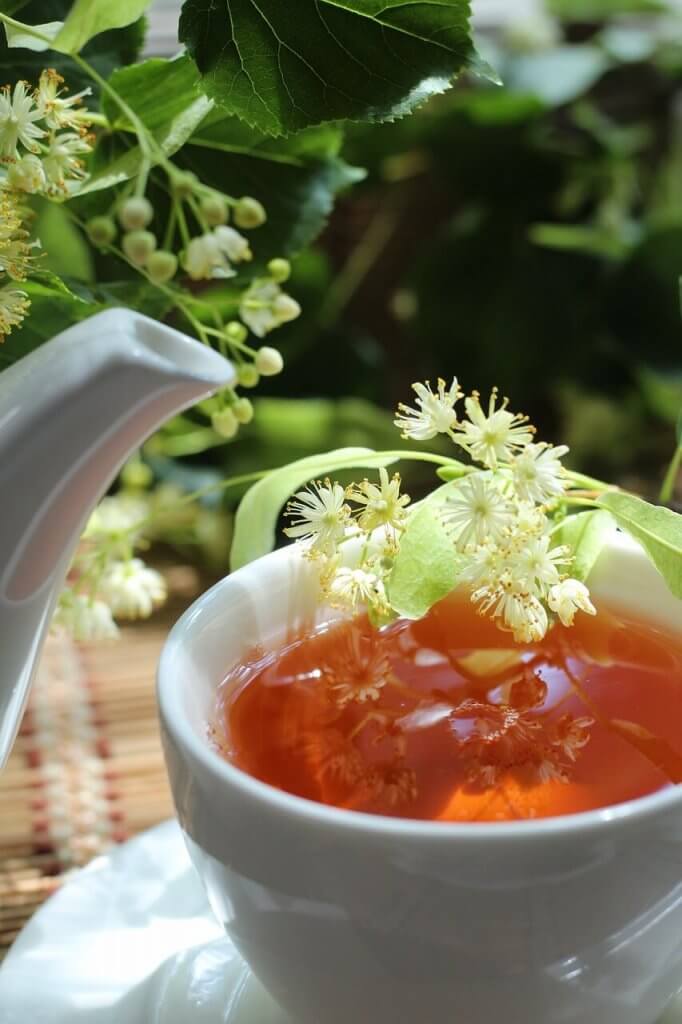
Elderflower Cordial
Using elderflower cordial as an elderflower liqueur substitute is a common and easy swap in many recipes. Here’s how you can do it:
- Adjust Quantity: Elderflower cordial is typically sweeter and less alcoholic than elderflower liqueur. Start by using the same quantity as the recipe calls for elderflower liqueur, but be prepared to adjust based on taste.
- Alcohol Content: Elderflower liqueur adds a hint of alcohol to recipes. If this is an important aspect of your dish, consider adding a small amount of a neutral spirit like vodka or gin to the elderflower cordial to mimic the alcohol content.
- Balancing Sweetness: Elderflower cordial is sweeter than elderflower liqueur, so you may need to reduce the amount of other sweeteners in your recipe. Taste as you go and adjust accordingly.
- Citrus Zest or Juice: Elderflower liqueur often has citrusy notes. To replicate this, consider adding a touch of lemon or orange zest or a small amount of citrus juice to your dish when using elderflower cordial.
- Dilution: If your recipe requires the liquid volume of elderflower liqueur but you don’t want the sweetness to be overpowering, you can dilute the elderflower cordial with a bit of water to achieve the desired balance.
- Taste and Adjust: The key to a successful substitution is to continually taste and adjust as you go. Everyone’s palate is different, so make sure the flavor profile suits your preferences and the specific recipe you’re working on.
By following these tips, you can effectively substitute elderflower cordial for elderflower liqueur while maintaining the essence of elderflower in your dishes.
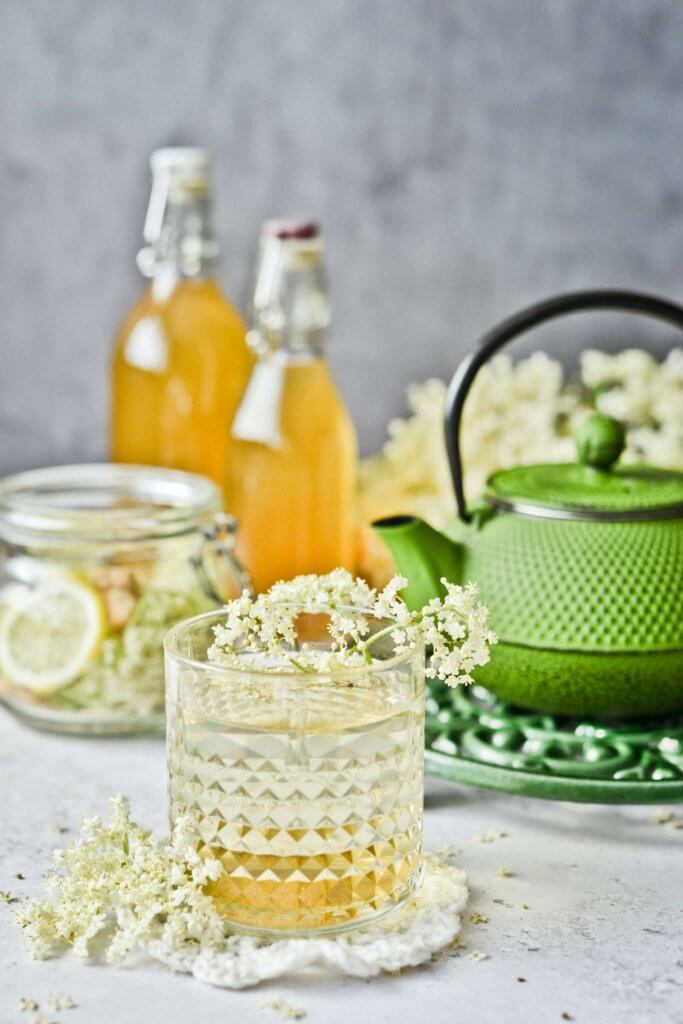
Lavender Syrup
Substituting lavender syrup for elderflower liqueur can add a unique floral twist to your recipes. Here’s how to do it while keeping your dishes flavorful for your food blog:
- Adjust Quantity: Lavender syrup is sweeter and more intensely flavored than elderflower liqueur. We suggest using about half the amount of lavender syrup as the recipe calls for elderflower liqueur. You can adjust to taste from there.
- Dilute if Necessary: Lavender syrup can be quite concentrated, so you might need to dilute it with a bit of water to match the consistency of elderflower liqueur in your recipe. Start with a 1:1 ratio and adjust as needed.
- Balance Sweetness: Since lavender syrup is sweet, consider reducing the amount of other sweeteners in your recipe. Taste as you go to ensure the sweetness is balanced to your liking.
- Citrus Zest or Juice: Elderflower liqueur often has citrusy notes, so you can add a touch of lemon or orange zest or a small amount of citrus juice to your dish when using lavender syrup to mimic that aspect of the flavor profile.
- Experiment: Lavender has a distinct flavor, so be prepared for a different taste experience. Experiment with different ratios and combinations to find the right balance for your recipes.
- Garnish: Consider garnishing your dishes with fresh or dried lavender buds to enhance the lavender aroma and make your presentation visually appealing.
Remember, the substitution of lavender syrup for elderflower liqueur will result in a different flavor profile, but it can be a delightful twist in your recipes.
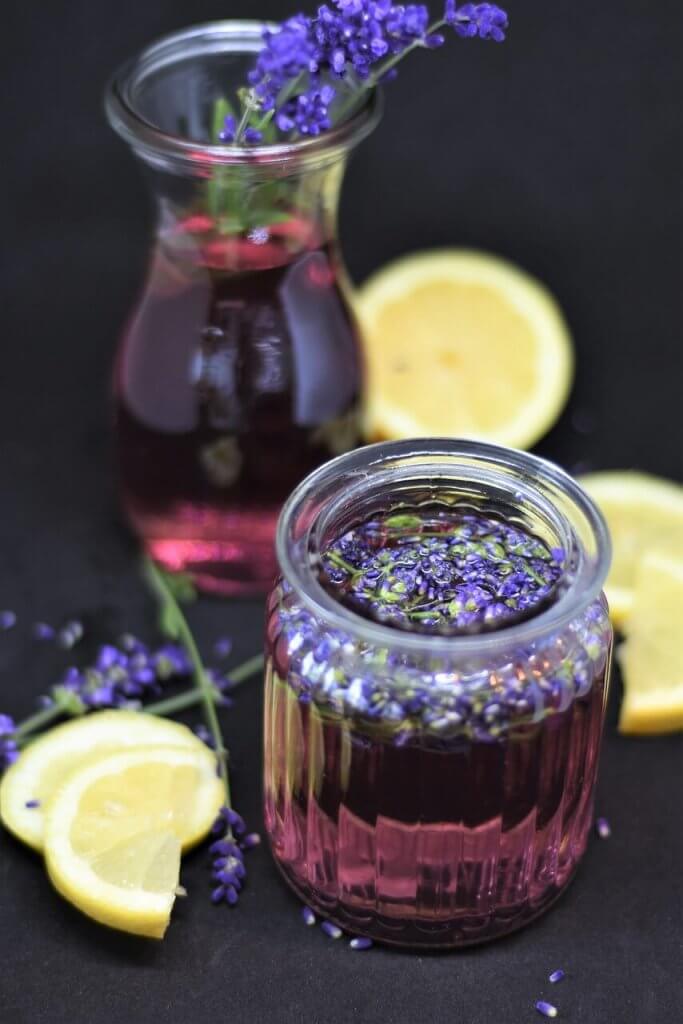
Rosewater
Using rosewater as elderflower liqueur substitute can infuse your recipes with a delightful floral aroma and taste. Here’s how to make the swap while keeping your dishes flavorful for your food blog:
- Quantity Adjustment: Rosewater is quite potent, so use it sparingly. Start with a small amount, about 1/4 to 1/3 of the quantity of elderflower liqueur called for in the recipe. You can always add more if needed.
- Balancing Sweetness: Elderflower liqueur is sweet, so if your recipe requires sweetness, consider adding some simple syrup or honey to the dish to make up for the lack of sweetness in rosewater.
- Citrus Enhancements: To mimic the citrusy notes found in elderflower liqueur, add a touch of lemon or orange zest or a small amount of citrus juice to your dish when using rosewater.
- Dilution: You will need to dilute the Rosewater with a bit of water to avoid overpowering the dish. Start with a 1:1 ratio of rosewater to water and adjust as needed.
- Taste and Adjust: As with any substitution, the key is to taste as you go and adjust to your liking. Rosewater has a strong flavor, so finding the right balance is essential.
- Garnish: Consider garnishing your dishes with edible rose petals or a sprinkle of dried rosebuds for a visually appealing touch and an extra burst of rose aroma.
Remember that rosewater will impart a distinctive floral flavor, which can be quite pleasant in many recipes.
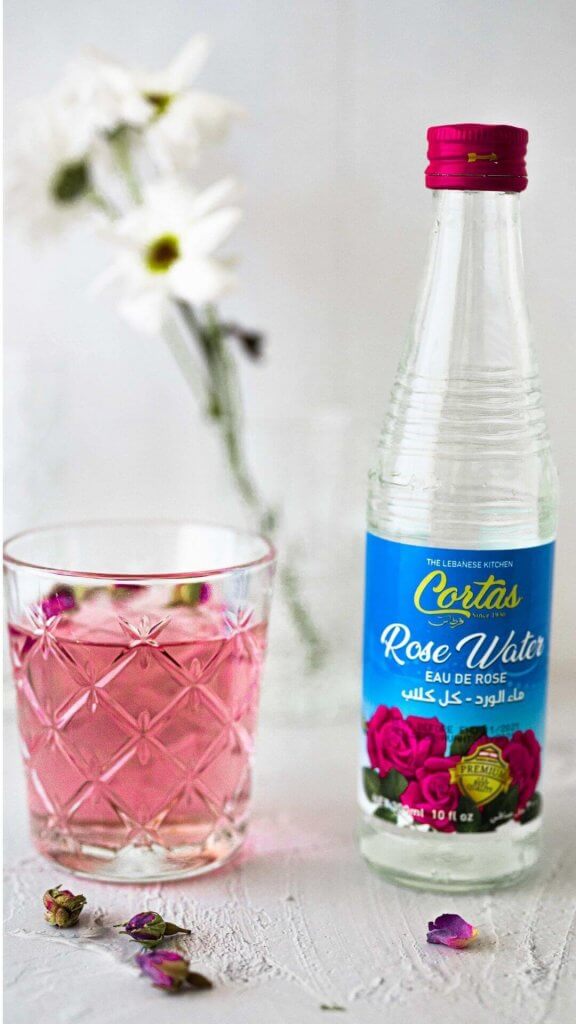
Orange Blossom Water
Substituting orange blossom water for elderflower liqueur can add a unique floral and citrusy twist to your recipes. Here’s how to do it while keeping your dishes flavorful for your food blog:
- Quantity Adjustment: Orange blossom water is potent, so use it sparingly. Start with a small amount, around 1/4 to 1/3 of the quantity of elderflower liqueur called for in the recipe. You can adjust to taste from there.
- Balancing Sweetness: Elderflower liqueur is sweet, so if your recipe requires sweetness, consider adding some simple syrup or honey to the dish. This will help compensate for the lack of sweetness in orange blossom water.
- Citrus Enhancements: Orange blossom water has a natural citrusy aroma, but you can enhance this by adding a touch of lemon or orange zest or a small amount of citrus juice to your dish.
- Dilution: Orange blossom water is quite concentrated, so you may need to dilute it with a bit of water to avoid overwhelming the dish. Start with a 1:1 ratio of orange blossom water to water and adjust as needed.
- Taste and Adjust: Always taste as you go and adjust the quantity of orange blossom water to achieve the desired flavor profile. Remember that it can be quite strong, so a little goes a long way.
- Garnish: Consider garnishing your dishes with a twist of orange peel or a few edible orange blossoms to enhance the citrusy and floral aroma.
Using orange blossom water as a substitute for elderflower liqueur can bring a unique and refreshing flavor to your recipes.
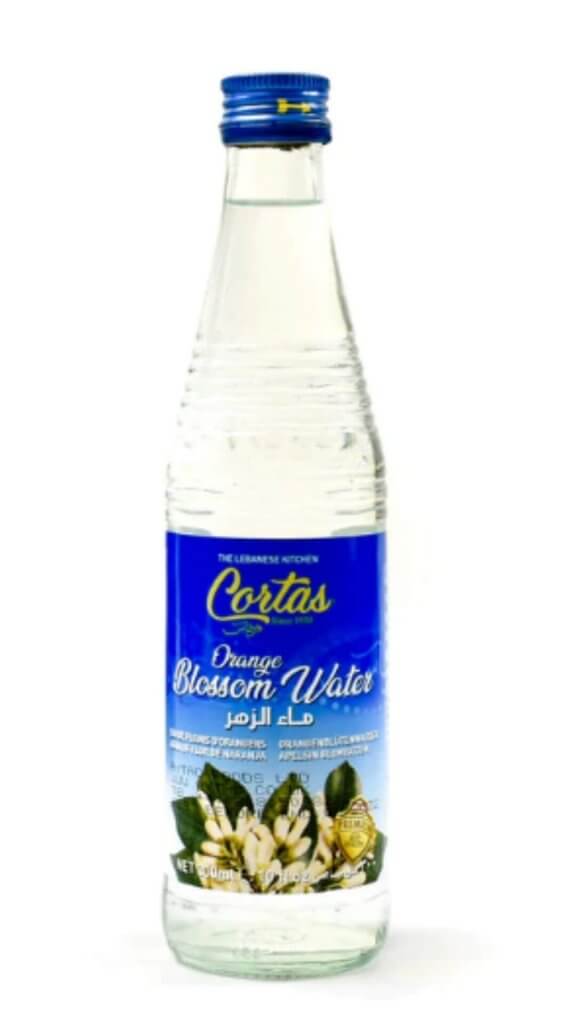
Chamomile Tea
Substituting chamomile tea for elderflower liqueur can impart a gentle, floral note to your recipes. Here’s how to do it while maintaining a flavorful profile for your food blog:
- Brew Strong Chamomile Tea: Start by brewing a strong chamomile tea. Use about 2 to 3 times the amount of chamomile flowers you would typically use for a cup of tea. Let it steep for a longer time, around 10-15 minutes, to extract as much flavor as possible.
- Reduce Liquid Content: Since chamomile tea is quite watery, you’ll want to reduce the liquid content in your recipe to compensate. Start with the same quantity as the recipe calls for elderflower liqueur, and then reduce other liquid components.
- Balancing Sweetness: Chamomile tea is not sweet on its own, so consider adding a touch of honey, agave nectar, or simple syrup to your recipe if it requires sweetness. Adjust to taste.
- Citrus Enhancement: To mimic the citrusy notes often found in elderflower liqueur, consider adding a bit of lemon or orange zest or a small amount of citrus juice to your dish.
- Taste and Adjust: As with any substitution, it’s crucial to taste as you go and adjust the quantity of chamomile tea and other ingredients to achieve the desired flavor profile. Chamomile has a gentle, soothing taste, so you may need to add a bit more to capture the essence of elderflower.
- Consider the Aroma: Keep in mind that chamomile tea has a distinct aroma. This can add a lovely, calming aspect to your recipes, which can be a unique selling point on your food blog.
Using chamomile tea as a substitute for elderflower liqueur can provide a soothing and floral dimension to your dishes.
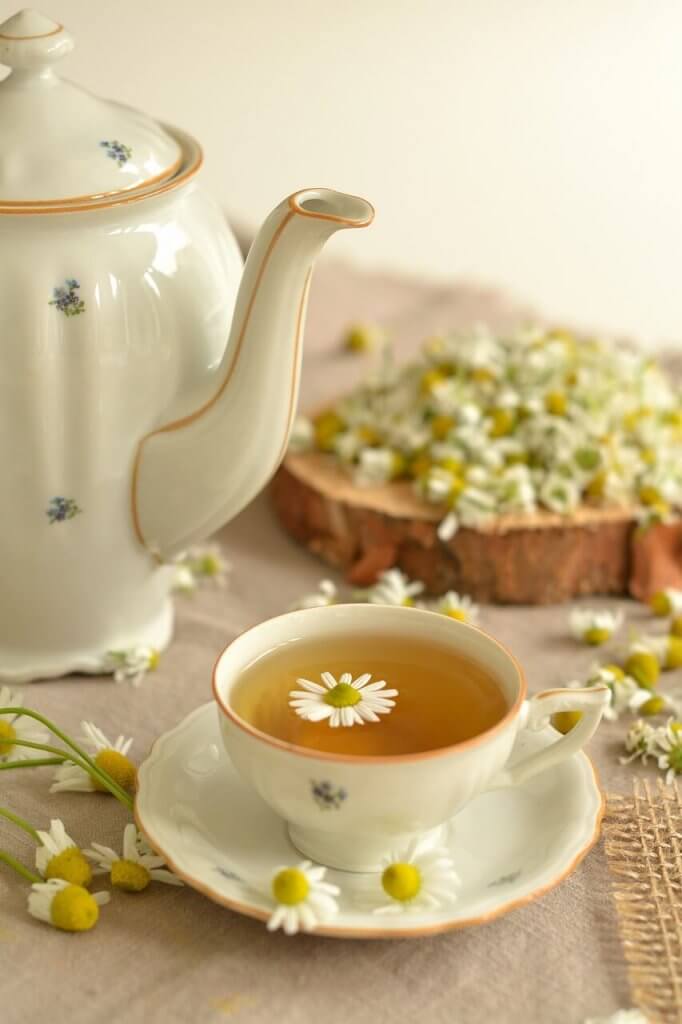
Honeysuckle Syrup
Substituting honeysuckle syrup for elderflower liqueur can bring a delightful floral sweetness to your recipes. Here’s how to do it while:
- Quantity Adjustment: Honeysuckle syrup tends to be sweeter than elderflower liqueur. Start by using about 3/4 to 2/3 of the quantity of elderflower liqueur called for in the recipe. You can adjust to taste as needed.
- Balance Sweetness: Since honeysuckle syrup is already sweet, you may need to reduce the amount of other sweeteners in your recipe. Taste as you go and adjust to achieve the desired sweetness level.
- Citrus Enhancement: Elderflower liqueur often has citrusy notes, so consider adding a bit of lemon or orange zest or a small amount of citrus juice to your dish when using honeysuckle syrup to mimic that aspect of the flavor profile.
- Dilution: Honeysuckle syrup can be quite concentrated, so you may need to dilute it slightly with water to match the consistency of elderflower liqueur in your recipe. Start with a 1:1 ratio of syrup to water and adjust as needed.
- Taste and Adjust: Always taste as you go and adjust the quantity of honeysuckle syrup and other ingredients to achieve the desired flavor profile. Honeysuckle has a unique, sweet floral taste that you’ll want to showcase.
- Garnish: Consider garnishing your dishes with edible honeysuckle flowers to enhance the visual appeal and reinforce the honeysuckle aroma and flavor.
Using honeysuckle syrup as a substitute for elderflower liqueur can add a charmingly sweet and floral dimension to your recipes.
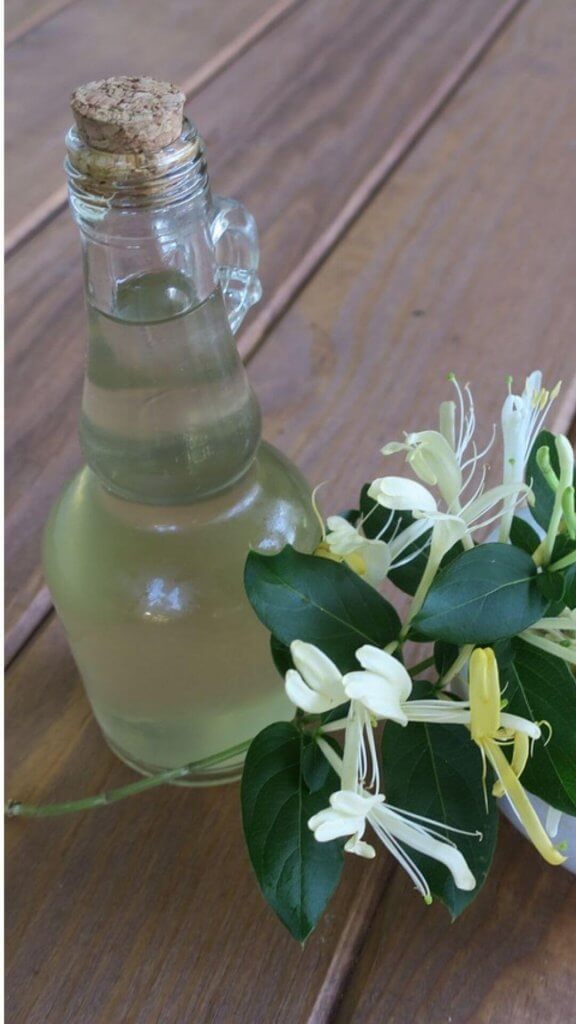
Jasmine Tea
Useing jasmine tea as elderflower liqueur substitute can infuse your recipes with a delicate floral aroma and flavor. Here’s how to do it:
- Brew Strong Jasmine Tea: Start by brewing a strong cup of jasmine tea. Use about 2 to 3 times the amount of jasmine tea leaves you would typically use for a cup of tea. Let it steep for a longer time, around 10-15 minutes, to extract maximum flavor.
- Reduce Liquid Content: Jasmine tea can be quite watery, so you’ll want to reduce the liquid content in your recipe to compensate. Start with the same quantity as the recipe calls for elderflower liqueur, and then reduce other liquid components.
- Balancing Sweetness: Jasmine tea is not inherently sweet, so consider adding a touch of honey, agave nectar, or simple syrup to your recipe if it requires sweetness. Adjust to taste.
- Citrus Enhancement: To mimic the citrusy notes often found in elderflower liqueur, consider adding a bit of lemon or orange zest or a small amount of citrus juice to your dish.
- Taste and Adjust: As with any substitution, it’s crucial to taste as you go and adjust the quantity of jasmine tea and other ingredients to achieve the desired flavor profile. Jasmine tea has a delicate, floral taste, so you may need to add more to capture the essence of elderflower.
- Consider the Aroma: Jasmine tea has a distinct and aromatic floral quality. This can add a lovely dimension to your dishes and create an inviting atmosphere for your food blog.
Using jasmine tea as a substitute for elderflower liqueur can bring a subtle and enchanting floral element to your recipes.
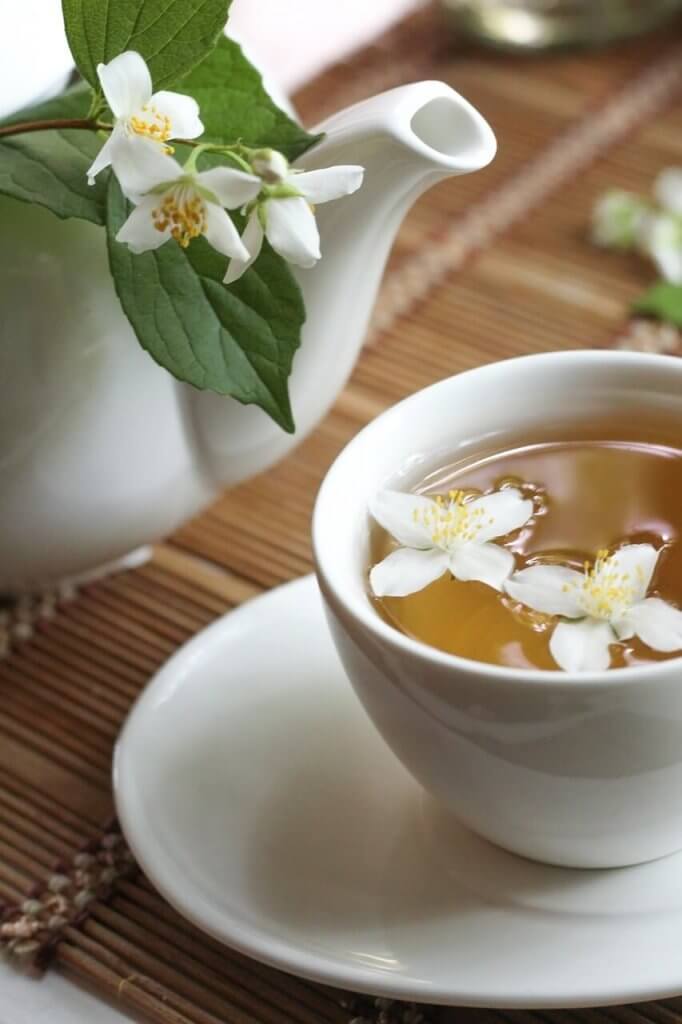
FAQs
Is elderflower the same as cordial?
Elderflower and cordial aren’t exactly the same, but they’re closely related! Elderflower refers to the blossoms of the elderberry tree, which have a delicate, floral flavor. These blossoms are the main ingredient in elderflower cordial, a sweet, fragrant syrup made by infusing elderflowers with water, sugar, and usually some citrus like lemon.
So, while elderflower is the raw ingredient, cordial is the delicious drink or syrup made from it. Elderflower cordial is fantastic mixed with sparkling water for a refreshing drink, or added to cocktails, desserts, and even baked goods for a lovely floral twist. If you haven’t tried it yet, it’s definitely worth a taste!
What is a substitute for St-Germain elderflower liqueur?
If you’re looking for a substitute for St-Germain elderflower liqueur, there are a few great options you can try! One of the best substitutes is elderflower cordial or syrup. While it’s non-alcoholic, you can mix it with a bit of vodka or gin to mimic the alcohol content and flavor profile of St-Germain.
Another alternative is Domaine de Canton, which is a ginger liqueur. While it has a different flavor, it offers a similar sweetness and can add an interesting twist to your cocktails.
You could also use Italicus Rosolio di Bergamotto, which has floral and citrus notes that complement many of the same drinks that call for St-Germain.
Lastly, for a more straightforward swap, you can use any other elderflower liqueur you find at your local liquor store. They might not have the exact same taste as St-Germain, but they’ll get you pretty close!
Fun Facts
- Elderflower has been used for centuries in various cultures for both culinary and medicinal purposes. The Ancient Romans and Greeks used it to treat ailments such as colds and flu, while European folk medicine used elderflower to help break fevers. They were also used as an insect repellent back in the day!
- Elderflower has a unique and delicate flavor. It is described as floral and slightly sweet taste and will add a refreshing twist to cocktails, desserts, and even savory dishes.
- Elderflower has a rich cultural significance. In folklore, elder trees were believed to be sacred and were often associated with protection from evil spirits. It was customary to ask permission from the elder tree before harvesting its flowers or branches, and cutting down an elder tree was considered bad luck. Additionally, elderflower has been associated with celebrations and festivities, making it a symbol of renewal and vitality in many cultures.
- Elderflower leaves are dark green and have sharp jagged edges. The leaves are normaly found in groups of five and when the leaves are crushed they release their strong scent.
Summary for Elderflower liqueur substitutes
Okay – that’s you all sorted with suitable substitutes for Elderflower liqueur.
As you can see there are plenty of options when you need an alternative for elderflower liqueur. Here’s a quick recap:
- Homemade Elderflower Syrup: Create your own elderflower syrup by steeping fresh or dried elderflowers in a simple syrup made from sugar and water. It’s the closest match in terms of flavor.
- St. Germain Elderflower Liqueur: If you’re looking for a commercial alternative, St. Germain is a well-known elderflower liqueur that replicates the taste beautifully.
- Elderflower Cordial: Widely available in stores, elderflower cordial is a non-alcoholic option with the same floral essence. Mix it with sparkling water for a refreshing drink.
- Linden Flower Tea: Linden flowers have a delicate floral aroma similar to elderflowers. Brew a strong cup of linden flower tea and use it as a substitute in recipes.
- Lavender Syrup: Lavender syrup brings a unique floral note to your cocktails and desserts. It can be a delightful substitute with a different twist.
- Rosewater: Although not quite the same flavor profile, a few drops of rosewater can add a floral touch to your creations.
- Orange Blossom Water: This aromatic water offers a subtle floral fragrance. It is great for cocktails, especially if you want a hint of citrus along with the floral notes.
- Chamomile Tea: While it won’t match elderflower exactly, chamomile tea can provide a gentle floral undertone in recipes, especially in baked goods.
- Honeysuckle Syrup: Honeysuckle has a sweet, honey-like flavor with floral notes. You can use it as a substitute for a unique twist.
- Jasmine Tea: Jasmine tea brings a fragrant, floral element to your drinks or desserts and can be used as a creative alternative.
We have gathered together a lot more facts on ingredients such as herbs, spices, oils, nuts, etc. if you would like to learn some more.
Or if you need to swap out another ingredient have a look at our Substitutes section.
